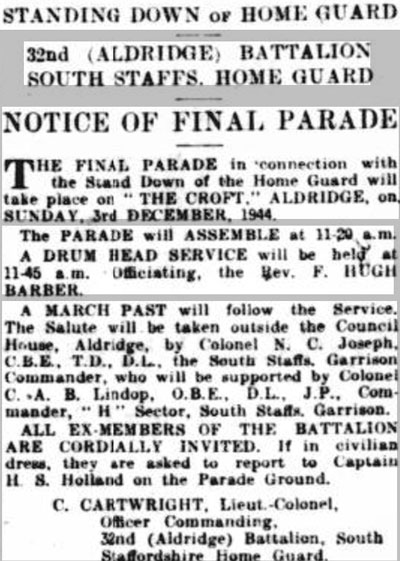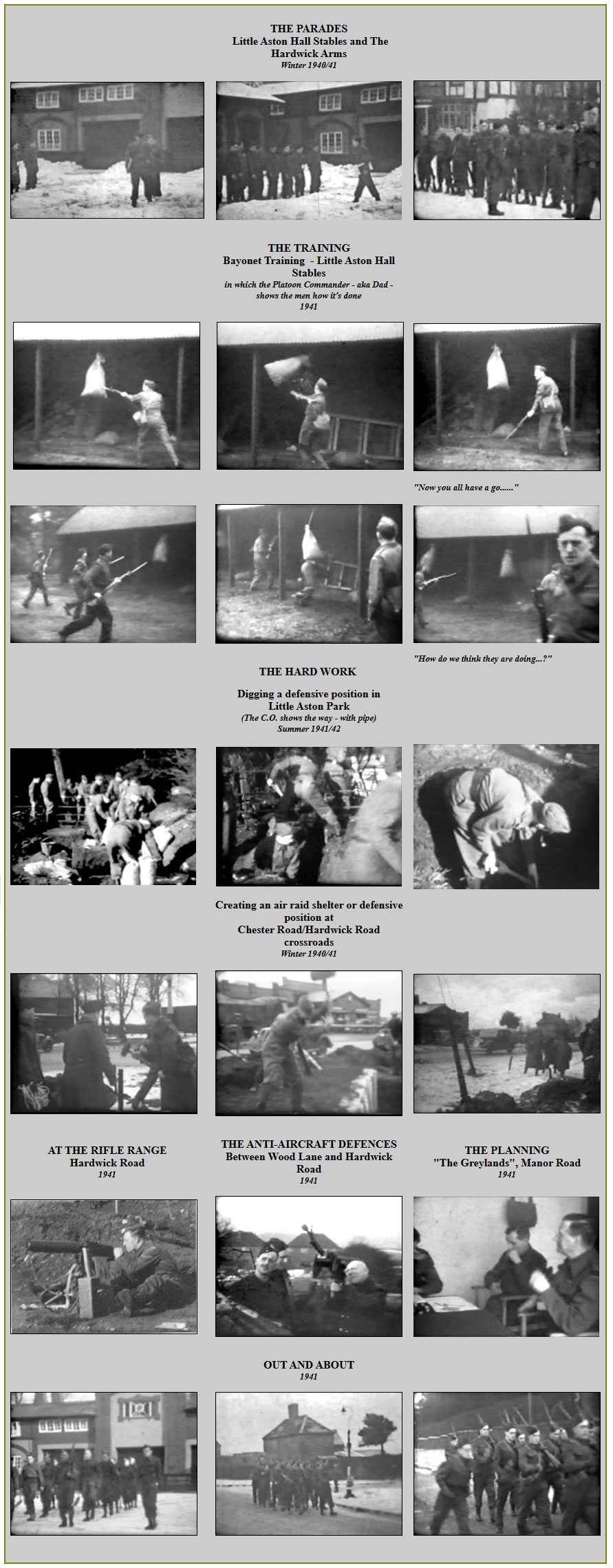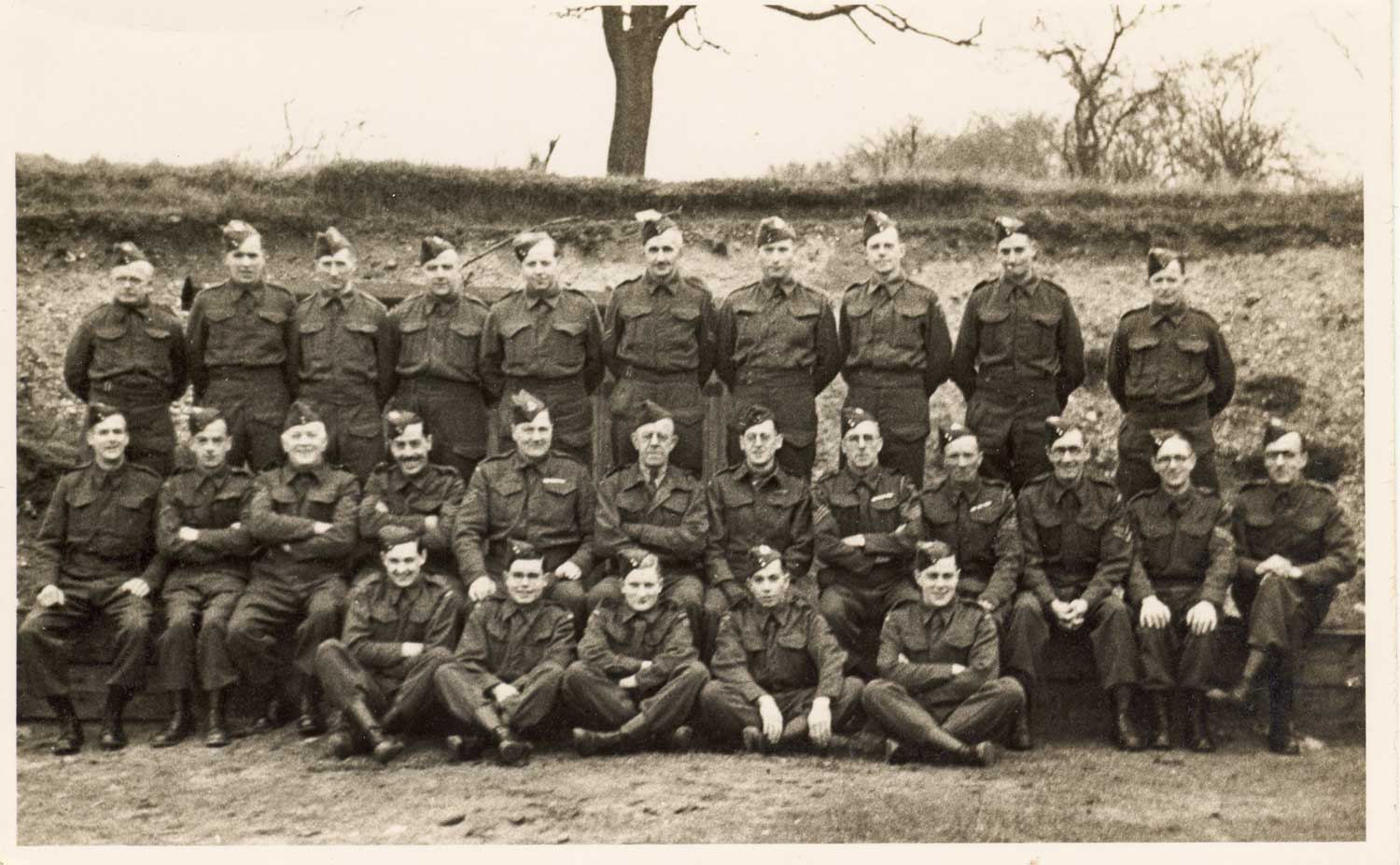Sunday 3rd December 1944
Dad's out at the moment. He
usually is, on a Sunday morning.
But today's special. It's the
last time he'll ever march with
his Home Guard comrades. Those
are the blokes who are all
members of the
32nd Staffordshire (Aldridge)
Battalion.
 They
are having a parade in
Aldridge.
That's where their main
Headquarters is, even though
they have others as well,
including the one in
Middleton Road, Streetly,
in a house called
"The Greylands".
And Dad used to have one at the
stables at Little Aston Hall.
That was before most of the men
there went to serve on
anti-aircraft guns and rockets. They
are having a parade in
Aldridge.
That's where their main
Headquarters is, even though
they have others as well,
including the one in
Middleton Road, Streetly,
in a house called
"The Greylands".
And Dad used to have one at the
stables at Little Aston Hall.
That was before most of the men
there went to serve on
anti-aircraft guns and rockets.
It's the very last parade. They
call it the stand-down parade.
There's been something about it
in the paper. And after that the
Home Guard is finished, here and
everywhere else. For ever.
I expect he'll be pleased,
because he has had to work very
hard at it, and all in his spare
time. For four-and-a-half years.
Ever so hard. I was only four
and a bit when he started, in
June 1940, and now I'm nearly
nine. I'm going to show you some
pictures of him and a lot of his
comrades in Streetly and Little
Aston and some of the things
they have been doing, for all
those years. We can see him at
Little Aston Hall,
where his platoon has its HQ in
the stables, showing the other
men how to attack a German
soldier with a bayonet. (I think
he learned all about that in the
last war and so probably most of
the older blokes there know how
to do it already. But they
might need a reminder in case
they have forgotten). And they
have been doing all sorts of
other things as well, in and
around Streetly and Little
Aston.

 But
I really think Dad will miss the
Home Guard sometimes. Especially
being with his friends, both
while he was on duty and
afterwards at the Hardwick Arms
or "The Greylands". And I expect
today he'd have been thinking
about my brother
(right, coming out of The
Greylands)
and all the other young Streetly
men who were in the Home Guard
as well, until they were called
up and went away. Of course they
are still not home and won't be
for a long time yet. The war
isn't finished, by any means,
even though the Home Guard is. But
I really think Dad will miss the
Home Guard sometimes. Especially
being with his friends, both
while he was on duty and
afterwards at the Hardwick Arms
or "The Greylands". And I expect
today he'd have been thinking
about my brother
(right, coming out of The
Greylands)
and all the other young Streetly
men who were in the Home Guard
as well, until they were called
up and went away. Of course they
are still not home and won't be
for a long time yet. The war
isn't finished, by any means,
even though the Home Guard is.
Mum
and I didn't go to the parade,
even though it was important.
Perhaps Dad said not to, because
it was a very rainy day and he
probably couldn't have taken us
in the car. I wish we had been
there, even so. I expect a lot
of other people were, though -
standing watching and cheering
as their husbands and dads and
sons and brothers marched by -
and probably with a few ladies
marching with them as well,
wives and mums and daughters.
Perhaps I shall hear more about
it tomorrow.
Monday 4th December 1944
As I said, Dad was on parade
yesterday morning, for the last
time. This is what the paper
said about it.
Almost every other member of the
Home Guard was doing the same
thing, in one place or another,
in every part of the country. I
am sure there was a huge parade
in the middle of
Birmingham. But I haven't
heard anything about that yet.
But the really, really huge
parade was the one in the middle
of
London. Every bit of the
Home Guard across the
country sent three or four
blokes to take part. That means
that over 100 men from
Birmingham and all around here
would have gone. They all
travelled together on a special
train from Snow Hill Station on
Saturday morning. Three of my
Dad's comrades went as well.
They were
Mr.
Chaplin,
Mr.
Greenaway and
Mr.
Cartwright. I don't know
them but they live somewhere
near us.
Later on Mr. Cartwright is
going to tell the story of what
happened and how they got on. It
must have been a wonderful time
for them. Seeing London AND the
King and Queen! (I'll tell you
later how to read it, if you are
interested).
But all that we know at this
moment is in the papers. This
morning's Daily Express tells us
what it was like to watch the
London Parade. There were about
7000 blokes marching. A lady
called Grace Herbert was writing
all about it. It's a good read
and it makes you feel as though
you were really there yourself:
|
They marched through
Hyde Park, sere and
leafless in the typical
December weather,
saluted the King, their
Colonel-in-Chief, went
off down Piccadilly to
the Circus, up Regent
Street, turned left
along Oxford Street to
Marble Arch, went by
Tyburn Gate, then down
through the Park again
to the Ring Road to
disperse, officially for
ever...... unless called
on for some fateful
emergency.
A spectator can
stand only at one place
along a route, see one
aspect of a marching
man's face, one set of
expressions - I felt a
strange, unusual wish to
cry. Why? These were
ordinary men, our
grocers, bank managers,
husbands, sons. Men we
see every day.
But for this day
they were uplifted into
something different.
They wore greatcoats and
tin hats, some carried
new rifles, others had
last-war rifles. Some
wore new boots which
were hurting them; some
were young - very young;
some were old - though
not too old. Men of 70
walked beside boys of
17. And they were
comrades. It was the
comradeship, not the
militancy, of this
procession, which made
me want to cry.
I stood near the
dais where the King, the
Queen and the two
Princesses were to take
the salute. The Royal
Standard curled in a
soft breeze. People
crowded the roof tops of
the Dorchester Hotel and
the houses of Stanhope
Gate just behind. Park
Lane was still.
In the middle
distance we heard a low
cheering. Five grey
horses of the
Metropolitan Police came
into view. Behind them
bobbed the khaki tin
hats of our voluntary
army. Several of us
stood on park seats so
that we could see both
them and the King and
Queen, and the
Princesses. The King
wore Field Marshal's
uniform; the Queen, a
black fur coat, a black
hat, and fox fur.
With them on the
saluting dais were Sir
James Grigg, War
Secretary, in a plain
black coat, and General
Sir Harold Franklyn,
Commander-in-Chief of
the Home Forces. The
Irish Guards band,
stationed opposite the
dais, played "Colonel
Bogey". Princess
Margaret whispered to
Elizabeth. They strained
forward past their
mother and father to see
the men advancing.
The King raised his
hand to the salute as
men of the London
district marched past.
Then came the
anti-aircraft gunners;
then the Eastern Command
contingent. For 45
minutes they marched by,
29 contingents, 11 Home
Guard bands. The crowd
cheered and clapped.
Nearly every person in
that crowd was looking
out for somebody they
knew in the parade.
It was an amazingly
large, good-natured
crowd. But it did not
cheer loud and long. One
woman said: "We are
still at war!" Which
seemed to sum up the
general feeling. There
were many Home Guards in
the crowd, both in and
out of uniform. And they
made remarks like these:
"Well, it shows the
war's nearing its end."
"Our job's done." "We
won't forget the friends
we've made in a hurry."
"Fancy every one of
those 7,000 men wearing
his own socks." "Now I
remember when we only
had sticks." "Now mum'll
have me back on her
hands." "Old Home Guards
never die..."
The line passed. The
police closed in. It was
over.
|
**********
I
shall miss the Home Guard. I only
saw a bit of what they were doing but I
DID enjoy being allowed to help Dad a
bit. Like polishing his brass buttons
and cleaning his boots. And
especially using a pull-through to make
the barrel of his rifle all clean and
shiny. That was really fun. I'm sorry as
well that I never saw Dad leading his
platoon along a street while crowds of
people on the pavement clapped and
cheered as the men marched past. And now
I never shall.
Let's allow some of the Streetly Home
Guard blokes to say good-bye to us.
Here's Dad's platoon, photographed at
the beginning of last year, in February
1943. It tells us who was who, and where
they ended up after they were disbanded
a bit later, to go on to other duties.

|
“A FEW OF THE OLD CROWD TAKEN EARLIER THIS YEAR (1943)”
Back Row (L to R)
Wood (Heavy A.A.), Cutler (ditto), Petersen (ditto), Jennens (ditto), Thompson (ditto), Collins (ditto), Richards (?cadet officer A.A.), Seedhouse (Lt. 10 N.Staffs HG), Gorman (Heavy A.A.), Gallett (“B” Coy.)
Middle Row
Talbot (Heavy A.A.), Brosch (Lt. 10 N.Staffs HG), MacBeth (A.A.), Carr (2/Lt. “B” Coy.), Puddepha (A.A. retired), Naylor (A.A.), Myers (“B” Coy.), Ramsay (B.S.M. A.A.), Jones (“B” Coy), Broomhead (2/Lt. A.A.), Wild (A.A.), Perry (Mess Corporal).
Front Row
Blackham H.W. (A.A.), Fisher (“B” Coy.), Hall (at O.C.T.U.), Izon (A.A.), Puddepha (R.A.F.)
Not on parade:
Blackham G. (“B” Coy.), Elwell (A.A.), Ford (“B” Coy.), Garbett (A.A.), Hammonds (Leics. Regt.), Hanman (A.A.), Hill (A.A.), Salt (A.A.), Winter (Black Watch), Foyle (A.A.), Kenworthy (unknown), Rees (unknown).
|
Cheerio
everyone - and thanks for what you did.
**********
P.S.
I promised to show you how
to read Mr. Cartwright's story about the
weekend of the London Parade, of what they did and saw and
what London is like (because, like me,
you have almost certainly never been
there). You can see it all
on these three pages.
|